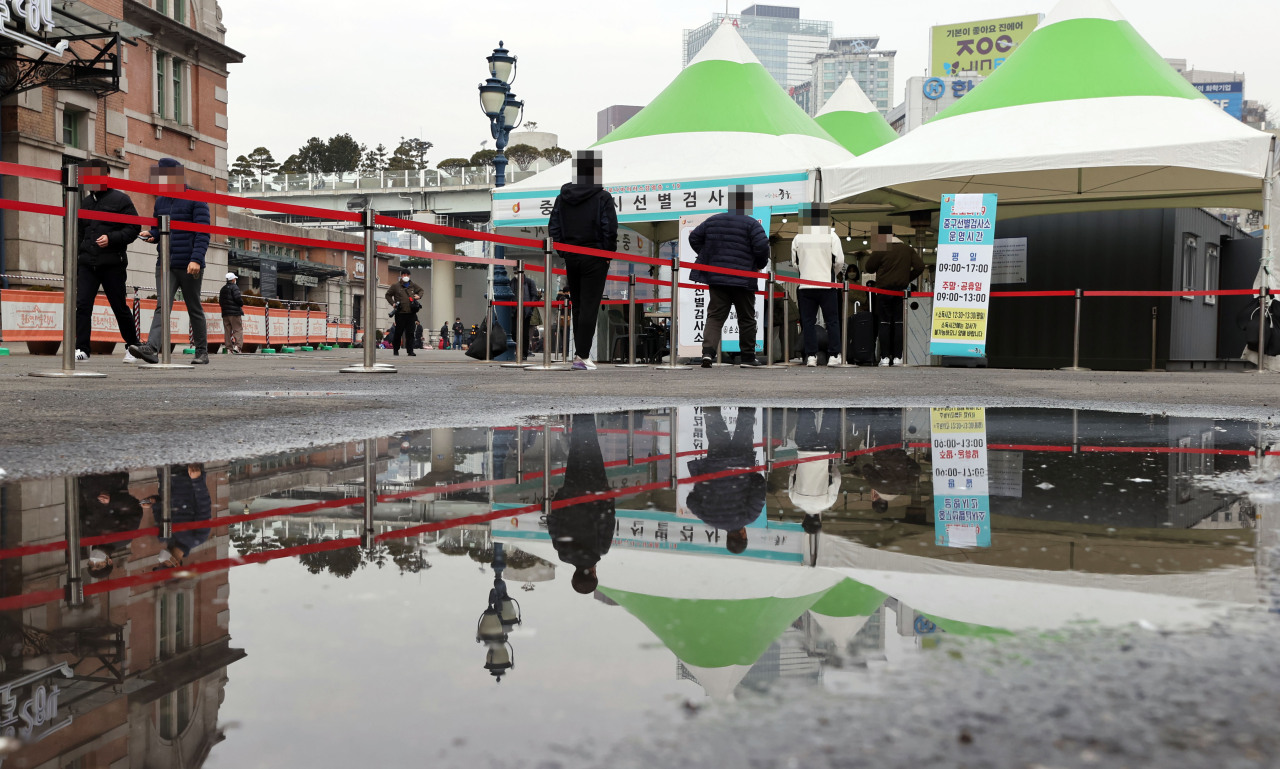 |
People stand in line to get COVID-19 tests at a temporary screening station in front of Seoul Station on Sunday. (Yonhap) |
South Korea's daily new coronavirus cases stayed in the 300s for the third consecutive day Monday on fewer tests during the Lunar New Year holiday, with social distancing measures eased to help small businesses whose operations have been in limbo over tougher regulations.
The country reported 344 more COVID-19 cases, including 323 local infections, raising the total caseload to 83,869, the Korea Disease Control and Prevention Agency (KDCA) said.
The country added five more deaths, raising the total to 1,527.
The number of new cases has remained in the 300s since Saturday in part because fewer people were tested for the coronavirus over the Lunar New Year holiday, which lasted for four days from Thursday.
New virus infections have been slowing down since the third wave of the pandemic peaked in late December, but authorities remain vigilant over a series of sporadic infections at religious facilities and the spread of more contagious variants.
South Korea has identified 94 cases of COVID-19 variants from Britain, South Africa and Brazil since December.
In response to growing outcry from small merchants, authorities lowered the social distancing to Level 2 -- the third highest in a five-tier system -- for the greater Seoul metropolitan area and Level 1.5 for other areas, for two weeks starting Monday.
The adjustment allows restaurants, coffee shops and gyms in Seoul and the surrounding Gyeonggi Province to remain open for an hour longer to 10 p.m. Nightclubs, karaoke bars and other entertainment venues will be allowed to reopen for the first time since November until 10 p.m.
About 480,000 multi-use facilities, including theaters, supermarkets, amusement parks and private institutions, can operate without curfews.
A ban on private gatherings of five or more people remains in place, while reunions of immediate family members are allowed.
Despite the relaxed restrictions, authorities appealed to business owners and people to keep abiding by antivirus guidelines to get the pandemic under control.
"Concerns remain over the spread of the virus as people traveled during the Lunar New Year holiday," Health Minister Kwon Deok-cheol said in a virus response meeting. "If people let their guard down in the wake of the eased social distancing measures, it could lead to resurgence of the virus."
The average number of locally infected people stayed at 375 over the four-day holiday, with nearly 80 percent of them reported in the Seoul metropolitan area, Kwon said.
To slow down the spread of the virus, the KDCA said it will roll out the first phase of its vaccine program on Feb. 26.
While authorities earlier planned to first inoculate about 750,000 elderly residents and employees in nursing homes with the AstraZeneca vaccine, the KDCA said it will begin inoculation of the priority group except those aged over 65 due to insufficient clinical data on efficacy for the age group.
The agency said it will decide on the vaccination program for the elderly residents in long-term care facilities after it receives additional data from AstraZeneca to ensure their safety.
"Considering it is important to raise the vaccination coverage to achieve the COVID-19 immunization goal, we made the decision as controversy over the vaccine's efficacy on the elderly could lower the vaccination rate among people and medical workers," KDCA Director Jeong Eun-kyeong said in a briefing.
The Ministry of Food and Drug Safety said it will supply Celltrion Inc.'s anti-COVID-19 monoclonal antibody treatment to local medical institutions starting Wednesday.
The ministry said Celltrion's CT-P59, the nation's first homegrown treatment, will only be administered to patients with its approval, who are most likely to be elderly patients aged over 60 or those with chronic illnesses.
Of the 323 locally transmitted cases, 147 cases were registered in Seoul and 99 in the surrounding Gyeonggi Province. Incheon, west of Seoul, had nine new cases. The greater Seoul area accounts for around half of the nation's 51 million population.
Twenty-one cases were from abroad, with five from the United States, six from Europe and three from Africa.
The number of seriously or critically ill COVID-19 patients was steady at 156.
The total number of people released from quarantine after making full recoveries was 73,794, up 235 from a day earlier.
The Seoul metropolitan government said it will step up monitoring of general hospitals as a growing number of cases were reported among patients and medical staff in large facilities.
A total of 31 new cases were linked to Soonchunhyang University Hospital in central Seoul, raising the total to 87 since two hospitalized patients tested positive for the virus Friday.
Hanyang University Medical Center in southeastern Seoul added three more cases to reach a total of 96.
Earlier in the day, police raided the headquarters of the International Mission headquarters, a local Christian missionary group in Daejeon, 164 kilometers south of Seoul, over suspected violations of antivirus protocols that led to a large outbreak of the coronavirus.
IM has been blamed for more than 400 cases of the coronavirus at its facilities, including at the IEM School in Daejeon. (Yonhap)



![[Today’s K-pop] Blackpink’s Jennie, Lisa invited to Coachella as solo acts](http://res.heraldm.com/phpwas/restmb_idxmake.php?idx=644&simg=/content/image/2024/11/21/20241121050099_0.jpg)




